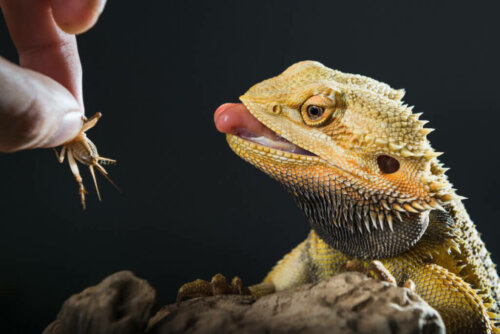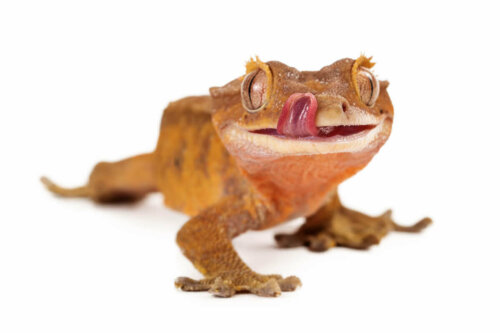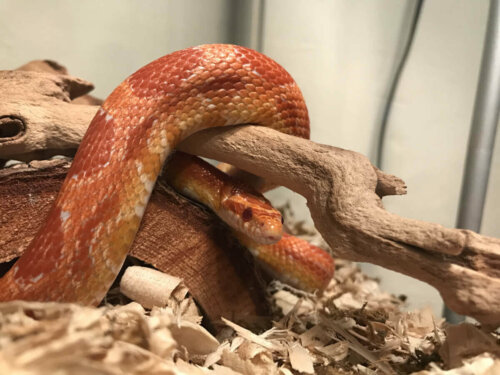Impaction in Reptiles: Symptoms and Treatments

Impaction in reptiles is a bowel obstruction, either due to the consumption of substrate, excess food, or any solid material that prevents the excretion of feces. In lizards and amphibians, it usually happens due to the accidental ingestion of sand or earth present in the terrarium.
Most reptiles, frogs, and toads feed by pouncing on their prey. In the process, they may end up eating elements that are undigestible. If you want to know how to avoid impaction in these exotic pets, read on.
The causes of impaction in reptiles
As we mentioned above, impaction is the accumulation of waste substances in an animal’s stomach and/or intestines. According to this definition, almost anything solid or semi-solid can cause impaction in an exotic pet.
Here are the most common causes of impaction. Pay close attention to them, as many inexperienced pet owners often overlook some of these mistakes:
- Firstly, disaggregated substrates. The animal can mistakenly ingest loose soil, fine sand, small stones, and other elements in the terrarium while eating.
- Overly big prey. It can be a real challenge for a medium-sized lizard to digest a big prey. You should never feed a reptile an invertebrate or vertebrate bigger than the size of its head, except for boas and other snakes.
- Prey with hard exoskeletons. It isn’t a good idea to feed reptiles beetles for this reason. It can be really hard for a reptile’s digestive system to break down exoskeletons.
- Very low temperatures. Reptiles are ectothermic. Thus, their metabolism is completely dependent on the outside temperature. Cold temperatures make digestion difficult. This favors the appearance of this condition.
- Finally, dehydration. A lack of water in the reptile’s body can harden stools. In these cases, it may be impossible for the animal to excrete them.
The first and second causes are extremely common. How many times have you seen a gecko in a terrarium with a sand substrate? If you have a central bearded dragon or a common leopard gecko with a stone or sand terrarium, impaction is almost guaranteed to occur.

Symptoms
The first clinical signs of this condition include lack of appetite, hard stools, or stools that contain pieces of substrate. If you don’t catch it in time, here are some of the moderate/severe symptoms your reptile could suffer:
- Tremors in the legs.
- Regurgitation. This is very evident in the case of many amphibians, as they can vomit their own stomachs before swallowing them again.
- Paralysis, lethargy, and chronic lack of appetite.
- A bluish spot on the abdomen. This is the impacted substrate, which can be seen through the abdominal epidermal transparency of many reptiles.
In the first stages, the clinical signs are simply of a natural constipation. Unfortunately, the animal can die if the condition worsens or isn’t treated. Many owners lose their exotic pets due to this condition without even knowing it.
Treatment of impaction in reptiles
The best treatment is prevention. For this purpose, it’s important for you to always use an organic substrate for any exotic reptile terrarium – no exceptions. You can find plant-based “sands”, composed of cellulose residues and other materials that the animal’s digestive tract can break down.
As veterinary publications indicate, sand is one of the worst possible substrates for reptiles. Little by little, the animal will swallow grains of this inorganic material, until there’s an impaction that’s almost impossible to remove, unless the reptile undergoes surgery.
In cases of mild impaction, you can bathe your pet with warm water every day. This usually activates the motility of the animal’s digestive system, leading to the release of feces during the bath. Another good option is to avoid feeding your reptile solid foods until it makes a bowel movement.
You can find organic sand substrates for reptiles on the market. If your pet ingests it, their digestive system will be able to break it down.

A very common mistake
As we mentioned above, not choosing the right substrate for their pet is a very common mistake first-time reptile owners make. Look into this before getting any exotic reptile. Remember that the health of a living being is at stake.
You can treat a mild case of impaction in reptiles by changing the animal’s environmental parameters, diet, and also their bathing routine. Unfortunately, if the condition worsens, the only option is to take your pet to the veterinarian for surgery.
All cited sources were thoroughly reviewed by our team to ensure their quality, reliability, currency, and validity. The bibliography of this article was considered reliable and of academic or scientific accuracy.
- Impactation, zoomed. Recogido a 27 de diciembre en https://zoomed.com/wp-content/uploads/Impaction.pdf
- Jurado González, N. (2019). Reporte de caso: impactación fecal en lagarto ovejero (Salvator merianae) en africam Safari.
- Albuquerque, I. M. B., Iturrizaga, D. M., Almeida, E. M., & Neto, J. D. M. L. S. (2013). IMPACTACIÓN FECAL EN UNA BOA (BOA CONSTRICTOR)-REPORTE DE CASO. Revista de Investigaciones Veterinarias del Perú, RIVEP, 24(4), 555-560.
